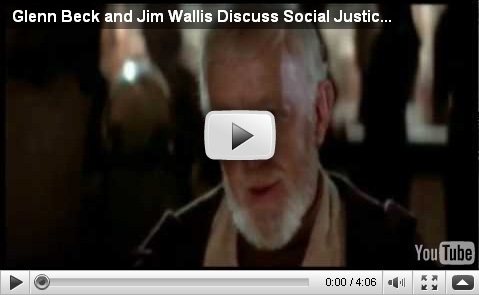Good Friday
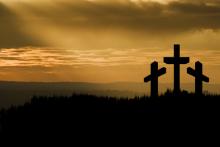
“Liturgical celebration is a re-entrance of the Church into the event, and this means not merely its ‘idea,’ but its living and concrete reality.”
—Fr. Alexander Schmemann
You and I bring our life experiences with us when we gather with other Christ followers for worship. Everything that has happened to us on our pilgrimage in this world accompanies us, in fact, wherever we go.
Our past is part of what makes us unique persons. What we have endured and felt and accomplished informs our conversations and often helps determines our actions in the present moment. This is what it means to be human.

A day of darkness and gloom, a day of clouds and thick darkness!
-Joel 2:2
Who in their right mind looks forward to Lent? Seven weeks of preparation to lead up to Good Friday hardly seems like an enjoyable way to spend our time.
Why not work on those New Year’s resolutions that have already been slipping instead? How about some more quality time with the family? What good, after all, can come from dwelling on darkness and death for more than forty days?
How about we all just agree to skip Lent this year and just get back together on Easter, okay?
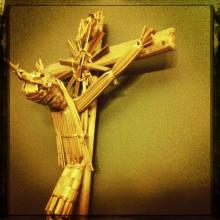
Good Friday. Is this something we can understand? What makes it so "good?"
Sure, we have theologies about this moment in history. We have systematic notions about why who and what. We tell the story every year. Some traditions reenact the tale more than once a year. If you attend a church from one of the "liturgical" traditions, you here the story told during the Eucharist every Sunday. "Christ has died. Christ has risen. Christ will come again." It's the Paschal Mystery told again and again. I also know some baptist preachers who tell the story of the Passion of Christ every Sunday. It is the Gospel, after all. This story, the Passion, is The Gospel for many of us Christian preachers. And to not share the Passion is to not share The Gospel. If their sermons don't end with the proclamation of the sarcifice of Jesus, well, then it just isn't Church.
I'm still sharing that e-unspoken part of my faith again. This is not new. Nor is it unintegrated with the rest of my Christian spirituality. It's actually essential to it. So, in the spirit of clarity, I'm sharing this stuff with you.
I have no idea what Jesus meant by giving himself over like this. We read the scripture last night at the Maundy Thursday service at First Baptist. "Not my will but your's." Lord, have mercy. Someone asked the question as someone does every year, "Why would God want Jesus to die? If it's God's will...Why would God will this to happen?" I have some practiced answers. This year I offered them as I usually do.
"First, let me tell you what the tradition says..." I give a theological gloss and watch their eyes glaze over. Right. Of course. This isn't an answer any more than a stump speech is an indication of what will actually happen if one of these people in the news are elected to public office. So, I move on.

“When you remember me, it means that you have carried something of who I am with you, that I have left some mark of who I am on who you are. It means that you can summon me back to your mind even though countless years and miles may stand between us. It means that if we meet again, you will know me. It means that even after I die, you can still see my face and hear my voice and speak to me in your heart. For as long as you remember me, I am never entirely lost. When I'm feeling most ghost-like, it is your remembering me that helps remind me that I actually exist. When I'm feeling sad, it's my consolation. When I'm feeling happy, it's part of why I feel that way. If you forget me, one of the ways I remember who I am will be gone. If you forget, part of who I am will be gone. "Jesus, remember me when you come into your kingdom." the good thief said from his cross (Luke 23:42). There are perhaps no more human words in all of Scripture, no prayer we can pray so well."
~ Frederick Buechner
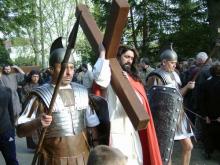
I’ve never liked the fact that we call the day on which we remember Jesus’ crucifixion “Good Friday.” What’s so good about it anyway? Personally I find the entirety of Holy Week – save for Easter – pretty depressing. Sure, the days are getting longer and things have started to grow all around us, but until Easter, the focus of the week is the suffering and death of an innocent man.
It turns out that, although plenty of folks have their own explanations, nobody actually knows why we call it Good Friday. I think the Germans are spot-on by calling it Karfreitag, which means “Suffering Friday.”
Figures the Germans would be more content to sit with suffering than the rest of us. They’re so serious! But I digress…

Here I am meditating on the broken body that holds the divine and the human in the mysterious way that only the Omniscient understands.
Today, I reflect on this body of Christ. It beckons me and I’m reminded once again that the violence and death that happened on that dark day lingers still.
It lingers still because we all are created in the image of God.
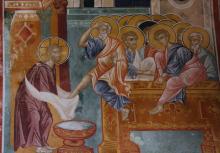
As we walk with Jesus ever closer to Good Friday, we recognize today as Maundy Thursday, commemorating the day that Jesus celebrated his last Passover meal — the Last Supper — with his disciples and washed their feet. Later that night, he would go with them to the Garden of Gethsemane, to wrestled with his humanity and the mission God the Father had called him to — to suffer and die on the cross at Golgatha the next day. Jesus asks his disciples to stay awake with him, to keep him company and join him in prayer. But they fall asleep, leaving Jesus alone in his dark night of the soul.
This is my body ... broken for you.
We've compiled a playlist of songs inspired by or that speak in some way to the Holy Week journey that brings us to Maundy Thursday and the great mandate from which the day takes its name: "If I, the Master and Teacher, have washed your feet, you must now wash each other's feet."
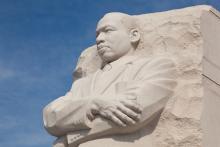
When my grandmother died when I was 15, I wanted the world to stop. I remember looking at traffic on the road near my home and just wanting everyone to be still — to stop and ponder what we all had lost in losing my grandmother and her love.
That adolescent desire is exponentially greater this week juxtaposed with the 44th anniversary of the martyrdom of the Rev. Dr. Martin Luther King, Jr., Maundy Thursday, Good Friday, and the continuing lack of criminal charges against the man who shot and killed Trayvon Martin in Florida last month.
So I grieve — and I’m not sure what to do with the grief.
 There's much to contemplate this Holy Week, from Palm Sunday and Maundy Thursday to Good Friday and Resurrection Sunday. Many artists have traveled this path, creating sonic accompaniment for the varied emotions evoked during this sacred week.
There's much to contemplate this Holy Week, from Palm Sunday and Maundy Thursday to Good Friday and Resurrection Sunday. Many artists have traveled this path, creating sonic accompaniment for the varied emotions evoked during this sacred week.
Here are a few tracks that move us, and that we’ll have in heavy rotation throughout until Easter Sunday and beyond, including one of the more unusual Resurrection Day songs you've likely ever heard from the Yeshu Bakhti band Aradhna, pictured at right.
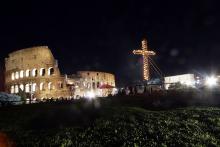
An elderly married couple asked by Pope Benedict XVI to write the texts for the traditional Stations of the Cross procession on Good Friday (April 6) at the Colosseum in Rome has chosen to tackle family problems such as marital infidelity and divorce.
Danilo Zanzucchi, 92, and his wife, Anna Maria, 83, who have been married for nearly 60 years and have five children, are the founders of the “New Families” group, an offshoot of Focolare, a Catholic movement.
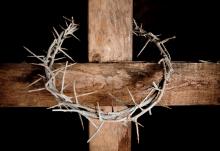
“When religion ruled the world, they called it the Dark Ages.”
That was the bumper sticker quote I read on the tailgate of a white minivan during my morning’s commute to work. Upon reading, I had so many adverse gut-reactions to this statement.
That’s so closed minded. And, Aside from a few erroneous events, don’t you know how much good Christianity has done for the world? And, I am sure you have all the answers to all the world’s problems then don’t you, Mr. White Minivan? (Amusingly, the sticker on the opposite side of the tailgate read “I think, therefore I don’t listen to Rush Limbaugh,” to which I thought, Meh, fair enough.)
Once I worked through my initial feelings of angst though, I reflected on those words a bit more. I realized maybe he has a point. When religion rules, things generally do not go well for the people practicing it, or for those who are being subjected to the religious standards.

Lots of folks love preaching about the risen Christ on Easter Sunday without talking about what he went through to get there. It’s a bad habit we Protestants have, but plenty of us skip right over Maundy Thursday and Good Friday to Easter.

In Christian confession, Good Friday is the day of loss and defeat; Sunday is the day of recovery and victory. Friday and Sunday summarize the drama of the gospel that continues to be re-performed, always again, in the life of faith. In the long gospel reading of the lectionary for this week (Matthew 27:11-54), we hear the Friday element of that drama: the moment when Jesus cries out to God in abandonment (Matthew 27: 46). This reading does not carry us, for this day, toward the Sunday victory, except for the anticipatory assertion of the Roman soldier who recognized that Jesus is the power of God for new life in the world (verse 54). Given that anticipation, the reading invites the church to walk into the deep loss in hope of walking into the new life that will come at the end of the drama.
